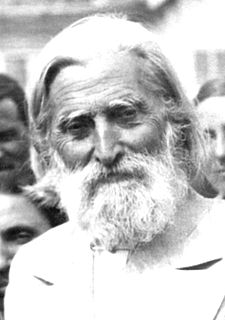A Quote by Potter Stewart
A person's mere propinquity to others independently suspected of criminal activity does not give rise to probable cause to search that person.
Quote Topics
Related Quotes
In existing criminology there are concepts: a criminal man, a criminal profession, a criminal society, a criminal sect, and a criminal tribe, but there is no concept of a criminal state, or a criminal government, or criminal legislation. Consequently what is often regarded as "political" activity is in fact a criminal activity.
The person in misery does not need a look that judges and criticizes but a comforting presence that brings peace and hope and life and says: 'you are a human person: important, mysterious, infinitely precious, what you have to say is important because it flows from a humn person; in you there are those seeds of the infinite, those germs of love... of beauty which must rise from the earth of your misery so humanity be fulfilled. If you do not rise then something will be missing... Rise again because we all need you... be loved beloved.'
Direct interference in a person's life does not enter our scope of activity, nor, on the other, tralatitiously speaking, hand, is his destiny a chain of predeterminate links: some 'future' events may be linked to others, O.K., but all are chimeric, and every cause-and-effect sequence is always a hit-and-miss affair, even if the lunette has actually closed around your neck, and the cretinous crowd holds its breath.
The usual devastating put-downs imply that a person is basically bad, rather than that he is a person who sometimes does bad things. Obviously, there is a vast difference between a "bad" person and a person who does something bad.
Besides, failure is an event, it is not a person - yesterday ended last night.
Tibetans look at a person who holds himself above others, believing he is better than others and knows more, and they say that person is like someone sitting on a mountain top: it is cold there, it is hard, and nothing will grow. But if the person puts himself in a lower position, then that person is like a fertile field.
No man can delegate,... any right of arbitrary dominion over a 3rd person; for that would imply a right in the 1st person, not only to make the 3rd person his slave, but also a right to dispose of him as a slave to still other persons. Any contract to do this is necessarily a criminal one...To call such a contract a “constitution” does not at all lessen its criminality, or add to its validity.


































